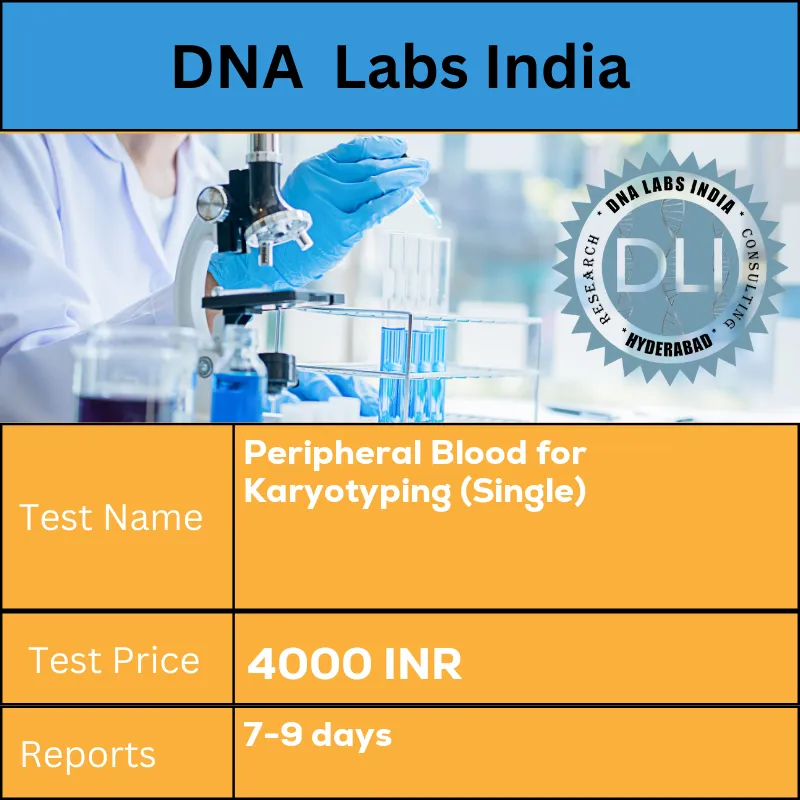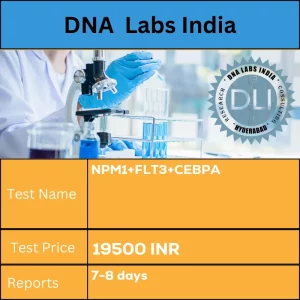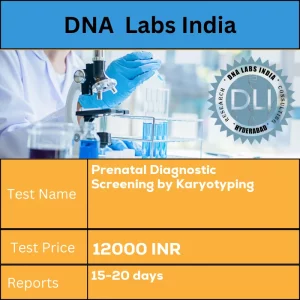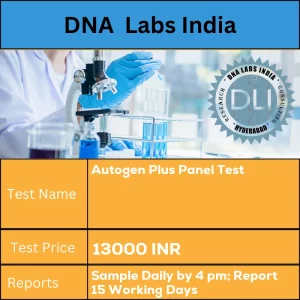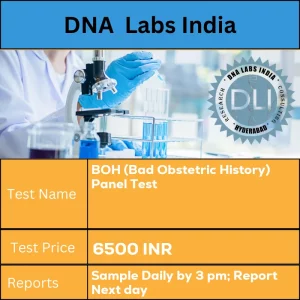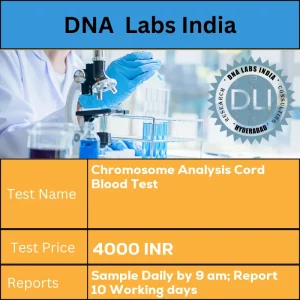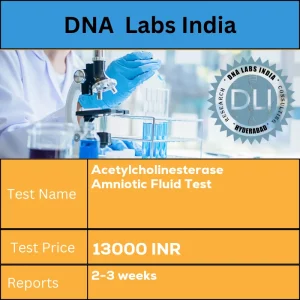Peripheral Blood for Karyotyping (Single) Cost 4000 INR Symptoms Diagnosis – DNA Labs India
Peripheral blood for Karyotyping is a diagnostic test that examines the chromosomes present in the blood cells. DNA Labs India offers this test at a cost of 4000 INR, making it an affordable option for individuals seeking genetic testing.
Symptoms of Peripheral Blood for Karyotyping
There are several symptoms that may indicate the need for Peripheral Blood for Karyotyping. These include:
- Recurrent miscarriages
- Unexplained infertility
- Family history of genetic disorders
- Developmental delays or intellectual disability
- Abnormal growth or physical features
- Increased risk for certain genetic conditions due to advanced maternal age
Diagnosis of Peripheral Blood for Karyotyping
The diagnosis of Peripheral Blood for Karyotyping involves taking a blood sample and analyzing it for any abnormalities in the chromosomes. The test can detect changes in the number or structure of chromosomes, which can lead to genetic disorders or birth defects. It is a highly accurate test and can provide valuable information for individuals and families.
Cost of Peripheral Blood for Karyotyping (Single)
The cost of Peripheral Blood for Karyotyping (Single) at DNA Labs India is INR 4000. This cost is inclusive of sample collection, testing, and counseling.
Conclusion
Peripheral Blood for Karyotyping is a valuable diagnostic test that can help identify genetic disorders and birth defects. DNA Labs India offers this test at an affordable cost of INR 4000, making it accessible to individuals seeking genetic testing. If you are experiencing any symptoms or have a family history of genetic disorders, it is recommended that you consult with a healthcare provider to determine if this test is right for you.
| Test Name | Peripheral Blood for Karyotyping (Single) |
|---|---|
| Sample type | Blood”,”Blood Sodium Heparin |
| Test type | Gynecologist |
| Pre-test Information | Peripheral blood for karyotyping (SINGLE) is performed using Cell culture methodology. Sample that have to be given is Peripheral blood in Sodium Heparin Vacutainer (2ml) for this test. You can expect results in 7-9 days |
| Disease | Genetics |
| Method | Cell culture |
| Purpose | Sodium Heparin Vacutainer (2ml) |
| Preparation | Ambient |
| Fasting | Peripheral blood for karyotyping (SINGLE) is performed using Cell culture methodology. Sample that have to be given is Peripheral blood in Sodium Heparin Vacutainer (2ml) for this test. You can expect results in 7-9 days |
| Get Reports | 7-9 days |
| Test Price | ₹ 4000 INR |
Note: We offer free home sample collection for online bookings for Peripheral Blood for Karyotyping (Single) and the test costs a special discounted price of 4000 INR across India. The cities where this service is available include Mumbai, Delhi, Bangalore, Hyderabad, Ahmedabad, Chennai, Kolkata, Surat, Pune, Jaipur, Lucknow, Kanpur, Nagpur, Indore, Thane, Bhopal, Visakhapatnam, Pimpri-Chinchwad, Patna, Vadodara, Ghaziabad, Ludhiana, Agra, Nashik, Faridabad, Meerut, Rajkot, Kalyan-Dombivali, Vasai-Virar, Varanasi, Srinagar, Aurangabad, Dhanbad, Amritsar, Navi Mumbai, Prayagraj, Howrah, Ranchi, Jabalpur, Gwalior, Coimbatore, Vijayawada, Jodhpur, Madurai, Raipur, Kota, Guwahati, Chandigarh, Thiruvananthapuram, Solapur, Hubballi-Dharwad, Tiruchirappalli, Tiruppur, Moradabad, Mysore, Bareily, Gurgaon, Aligarh, Jalandhar, Bhubaneswar, Salem, Mira-Bhayandar, Warangal , Guntur , Bhiwandi, Saharanpur, Gorakhpur, Bikaner, Amravati, Noida, Jamshedpur, Bhilai, Cuttack, Firozabad, Kochi, Nellore , Bhavnagar, Dehradun, Durgapur, Asansol, Rourkela, Nanded, Kolhapur, Ajmer, Akola, Gulbarga, Jamnagar, Ujjain, Loni, Siliguri, Jhansi, Ulhasnagar, Jammu, Sangli-Miraj & Kupwad, Mangalore, Erode10, Belgaum, Ambattur, Tirunelveli, Malegaon, Gaya, Jalgaon, Udaipur, Maheshtala, Davanagere, Kozhikode, Kurnool, Rajpur Sonarpur, Rajahmundry , Bokaro, South Dumdum, Bellary, Patiala, Gopalpur, Agartala, Bhagalpur, Muzaffarnagar, Bhatpara, Panihati, Latur, Dhule, Tirupati , Rohtak, Korba, Bhilwara, Berhampur, Muzaffarpur, Ahmednagar, Mathura, Kollam, Avadi, Kadapa, Kamarhati, Sambalpur, Bilaspur, Shahjahanpur, Satara, Bijapur, Rampur, Shivamogga, Chandrapur, Junagadh, Thrissur, Alwar, Bardhaman, Kulti, Kakinada, Nizamabad, Parbhani, Tumkur, Khammam, Ozhukarai, Bihar Sharif, Panipat, Darbhanga, Bally, Aizawl, Dewas, Ichalkaranji, Karnal, Bathinda, Jalna, Eluru, Kirari Suleman Nagar, Barasat, Purnia, Satna, Mau, Sonipat, Farrukhabad, Sagar, Rourkela, Durg, Imphal, Ratlam, Hapur, Arrah, Karimnagar, Anantapur, Etawah, Ambernath, North Dumdum, Bharatpur, Begusarai, New Delhi, Gandhidham, Baranagar, Tiruvottiyur, Puducherry, Sikar, Thoothukudi, Rewa, Mirzapur, Raichur, Pali, Ramagundam , Haridwar, Vijayanagaram, Katihar, Nagarcoil, Sri Ganganagar, Karawal Nagar, Mango, Thanjavur, Bulandshahr, Uluberia, Murwara, Sambhal, Singrauli, Nadiad, Secunderabad, Naihati, Yamunanagar, Bidhan Nagar, Pallavaram, Bidar, Munger, Panchkula, Burhanpur, Raurkela Industrial Township, Kharagpur, Dindigul, Gandhinagar, Hospet, Nangloi Jat, Malda, Ongole, Deoghar, Chapra, Haldia, Khandwa, Nandyal, Chittoor , Morena, Amroha, Anand, Bhind, Bhalswa Jahangir Pur, Madhyamgram, Bhiwani, Navi Mumbai Panvel Raigad, Baharampur, Ambala, Morvi, Fatehpur, Rae Bareli, Khora, Bhusawal, Orai, Bahraich, Vellore, Mahesana, Sambalpur, Raiganj, Sirsa, Danapur, Serampore, Sultan Pur Majra, Guna, Jaunpur, Panvel, Shivpuri, Surendranagar Dudhrej, Unnao, Hugli and Chinsurah, Alappuzha, Kottayam, Machilipatnam, Shimla, Adoni, Tenali, Proddatur, Saharsa, Hindupur, Sasaram, Hajipur, Bhimavaram, Dehri, Madanapalle, Siwan, Bettiah, Guntakal, Srikakulam, Motihari, Dharmavaram, Gudivada, Narasaraopet, Bagaha, Miryalaguda, Tadipatri, Kishanganj, Karaikudi, Suryapet, Jamalpur, Kavali, Tadepalligudem, Amaravati, Buxar, Jehanabad, Aurangabad.

